Controlled Burn
York Region successfully conducted a second controlled burn of a tallgrass prairie in the Bendor and Graves Tract at 18038 McCowan Road in the Town of East Gwillimbury.
On April 22, 2024, it took an hour to burn approximately 2.9 hectares of prairie.
To help protect this sensitive habitat, visitors are asked to stay on the trails.
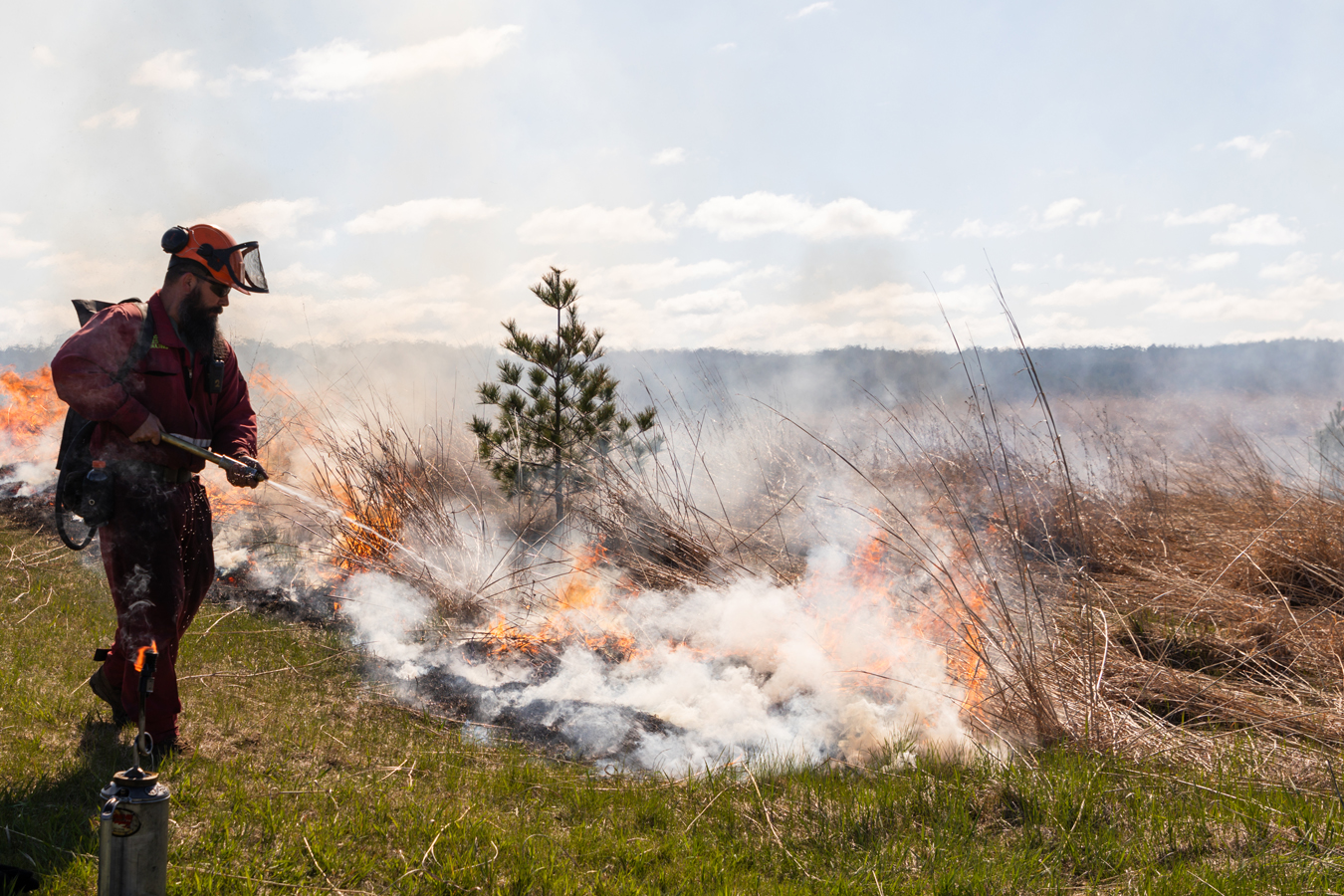
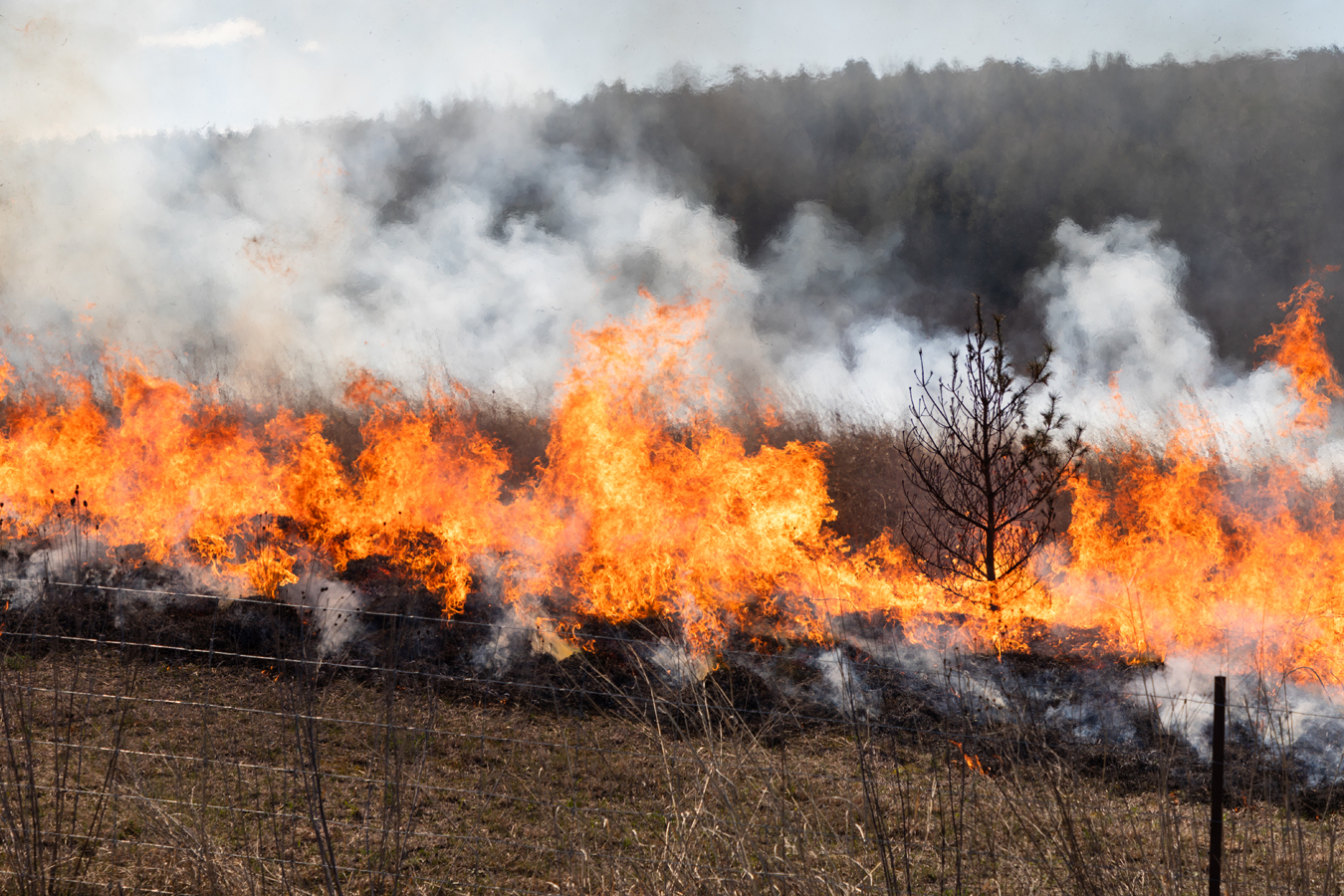
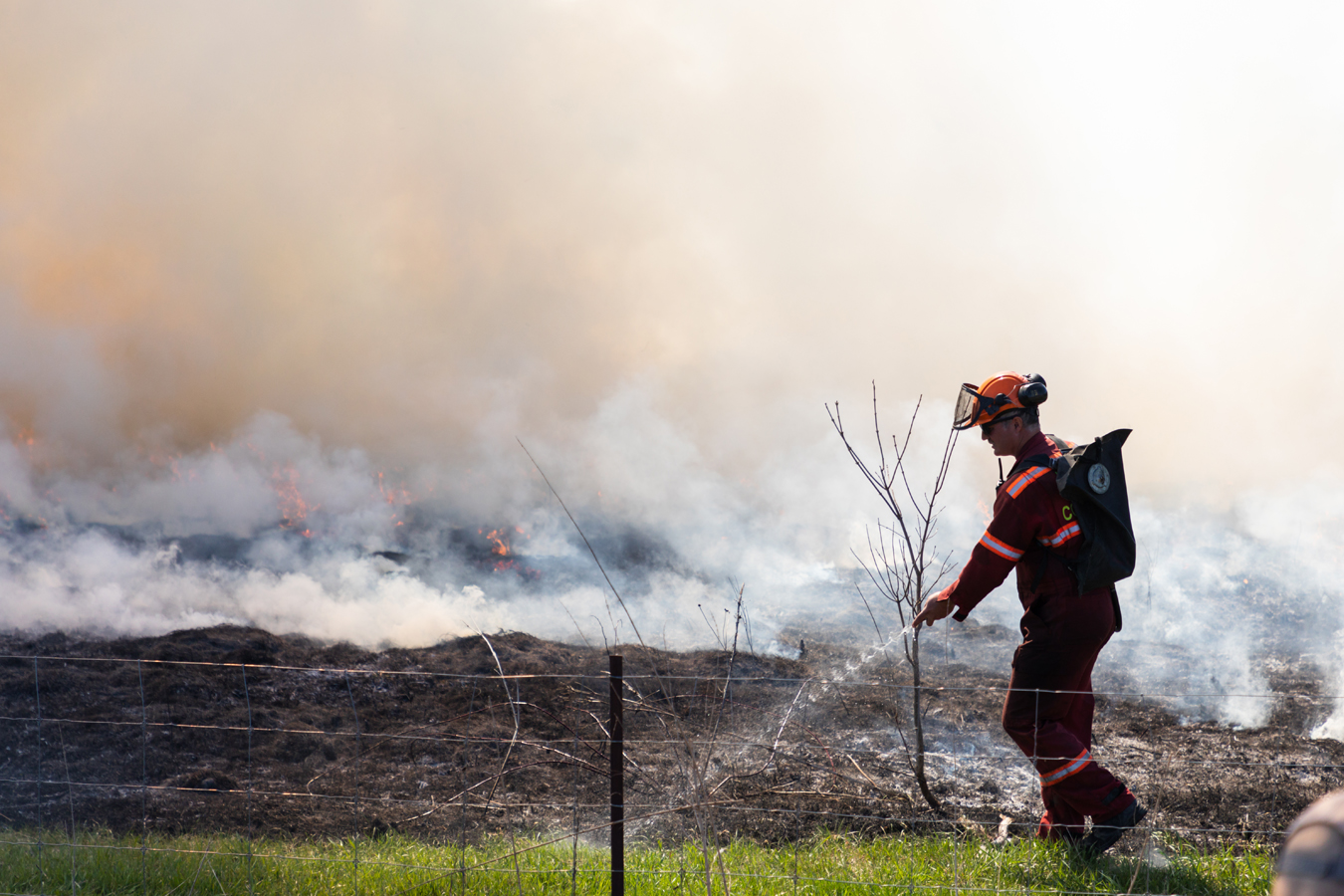
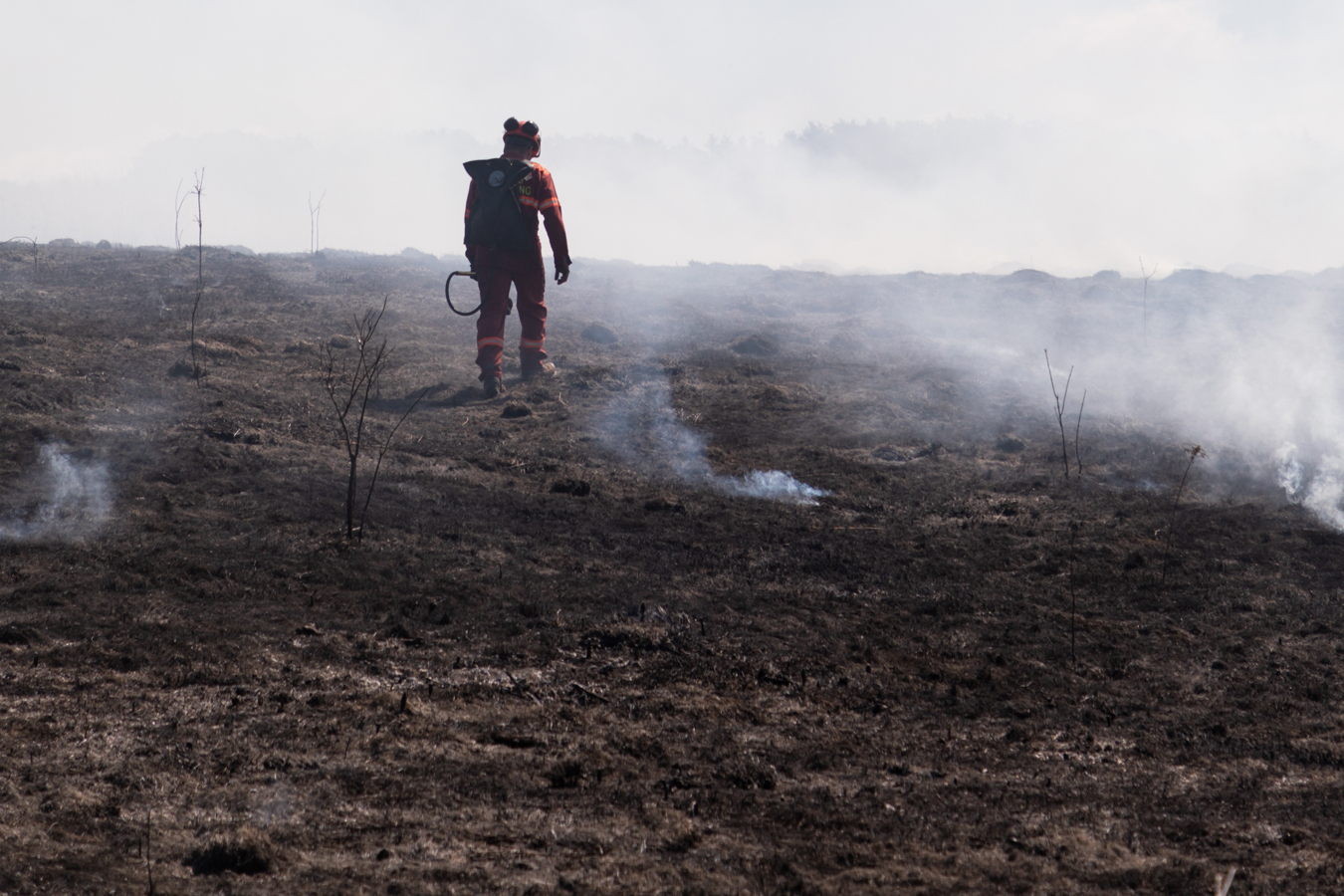
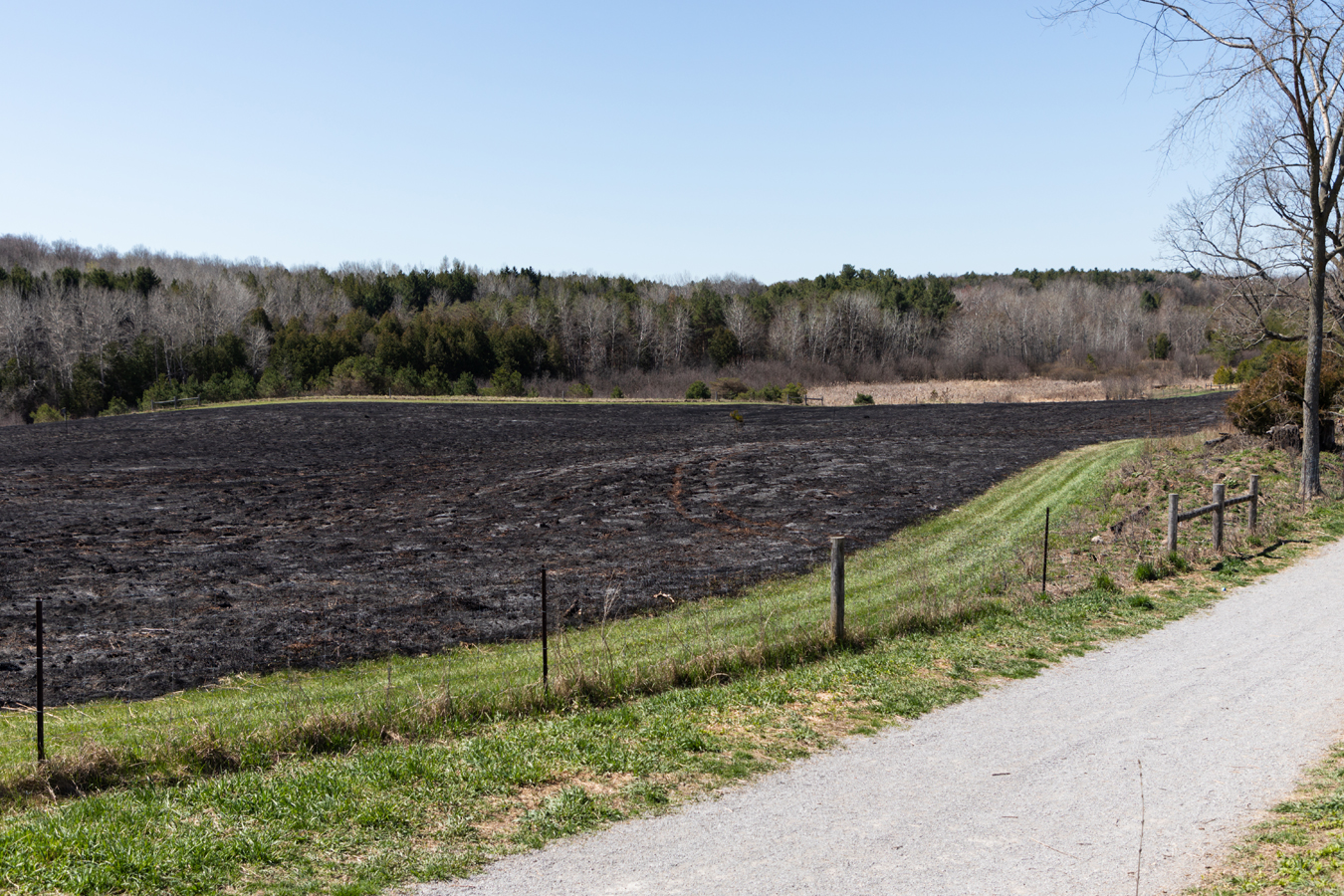
What are controlled burns?
A controlled (prescribed) burn is a deliberately set and carefully controlled fire that burns low to the ground and consumes dried leaves, small twigs and grass stems but does not harm larger trees or wildlife. Historically grasslands were maintained through natural wildfires that swept across the landscape. A controlled burn is designed to mimic the natural fires that once occurred in grasslands. They burn relatively quickly and are lit in such a way that they self-extinguish.
Fire-dependent grassland ecosystems, like tallgrass prairies and oak savannas, contain prairie plants that respond positively to burning and grow more vigorously than they would in the absence of fire. Plants that live in grasslands have deep underground root systems making them both drought and fire resistant.
Every few years a controlled burn is used to protect these valuable grasslands from invasive plants and encourage the growth of valuable grasses and wildflowers which provide food and shelter for a variety of wildlife including birds, bees and butterflies.
This was the fourth controlled burn of a tallgrass prairie carried out by York Region. In March 2018, the Region led a successful controlled burn at the Bendor and Graves Tract and at the Nobleton Tract in April 2022 and April 2023.
Why are controlled burns important?

Prior to human settlement wildfires were a natural occurrence, and grasslands including prairies and savannas evolved to be fire dependent. Since grasslands were easier to farm than properties covered in forests, most native grasslands were destroyed by early settlers.
While tallgrass prairies were once common in Ontario, it is estimated that only one per cent of the original (pre-settlement) cover of prairie and oak savanna ecosystems remain in Ontario today, and they are now considered a rare ecosystem.
With habitat destruction and an otherwise fire-adverse society, natural tallgrass prairies and oak savannas have no way of persisting on the landscape if we don’t let fire do its job. Fortunately for these habitats, a controlled burn provides the same effect as a natural wildfire but with minimal risk. Fire stops weedy plants, trees and shrubs from taking over while the fire-resistant grassland species, which store 65% of their energy below ground as roots, are able to regrow.
The York Regional Forest is home to a variety of ecosystems including grasslands and fire is an important management tool used to help maintain these habitats and ensure they continue to flourish. Controlled burns are a part of the long-term management plan to restore and enhance these rare and important ecosystems, and represent the Region’s commitment to supporting biodiversity, pollinators and healthy natural systems.
Importance of Pollinators
Pollinators, like the monarch butterfly, support our ecosystem that clean the air, stabilize soils, protect from severe weather and support other wildlife by cross pollinating, a process that allows plants to produce vegetables, fruit and seeds needed to create more plants.
It is estimated some 85% of the world’s flowering plants depend on a pollinator to move pollen from the male plant to female plant to produce vegetables, fruits, nuts and seeds. This includes about 35% of the crops people harvest and eat, meaning one out of every three bites of food you eat is there because of a pollinator. Pollination is also required for plants to reproduce, creating a plentiful food supply for the animals that produce dairy and meat.
Visit york.ca/BeesAndButterflies to learn more.
Frequently asked questions
Why is the exact date for the controlled burn not communicated in advance?
The date of the controlled burn is difficult to predict in advance as it depends on very specific site and weather conditions. A controlled burn ‘window’ was identified (March 15 and April 30, 2024) and when required site and weather conditions were achieved for a safe and controlled burn, a date was confirmed and residents who asked to be notified were advised (approximately 24 to 48 hours in advance).
Who was responsible for setting and controlling the fire?
The professional consultant and their crew oversaw the technical aspects of setting, controlling and extinguishing the fire. The consultant has experience conducting controlled burns in neighbouring jurisdictions including the City of Toronto, City of Mississauga and Simcoe County.
What precautions were in place to ensure the burn remained in ‘control’?
Several precautions were in place. The fire was lit only after required site and weather conditions including temperature and fuel moisture levels to ensure the wind speed and direction were favourable for the operation.
Staff mowed the perimeters of the burn location. These mowed areas (burn breaks) were about two tractor-widths wide and were wetted before the fire was lit using all-terrain vehicle (ATV) sprayers with mounted water tanks.
The Region’s consultant ignited and controlled the pattern of the fire to ensure fire lines were “burning into the black” meaning the fire was headed towards areas already burned so there was no more fuel and the fire self-extinguished.
The fire was constantly monitored by a team of staff with designated monitoring posts and everyone was in constant radio contact with one another. Multiple ATV units were outfitted with water tanks and sprayers, as well over 1,000 feet of fire hose connected to pumps and water sources were on site. Staff from the local Fire Department were also present during the burn.
Is smoke from the burn dangerous?
Fire smoke is made up of a mixture of gases and very small particles that are produced when organic matter burns. Exposure to smoke may cause burning eyes, runny nose, irritated throat and sinus and headache. Children, seniors, pregnant women and those who have underlying medical conditions such as heart or lung conditions may be more sensitive to the effects of smoke.
The impacts from exposure to smoke depend on many factors including weather conditions and proximity to the source. It is recommended that anyone sensitive to smoke stay away from areas with fire smoke. If individuals have trouble breathing or other symptoms, they should consult their healthcare provider. To minimize smoke from potentially entering your home, keep windows, doors and fire dampers closed as a precaution.
Who was notified?
Neighbouring residents and property owners were notified of the controlled burn via roadside signs, print ads, targeted digital ads and an information package.
Town of East Gwillimbury staff and Council were also notified and the York Regional Police, Town of East Gwillimbury Emergency and Community Safety Services and Ministry of Natural Resources and Forestry are some of the other organizations that were alerted.
Signage informing visitors to the Bendor and Graves Tract of the controlled burn was posted at the tract entrances.
Why are tallgrass prairies and oak savannas important?
It is estimated only 1% of the original pre-settlement cover of prairie and oak savanna ecosystems remain in Ontario. As a result, many of the plants that grow in tallgrass prairies and oak savanna are listed as rare or endangered in Canada.
Bendor and Graves Tract contains approximately 7 hectares (17 acres) of created prairie. A total of 2.9 hectares (7.2 acres) were burned at this time. This site is located within the historical range of grasslands that once covered much of southern Ontario. This habitat type is home to many species at risk such as birds like the Bobolink and Meadowlark and can support many important pollinator species of insects including monarch butterflies.
Why are controlled burns important for tallgrass prairies and oak savannas?
Prior to human settlement, wildfires were a natural occurrence. Prairies and savannas have evolved to be fire dependent. Controlled burns benefit native plants and animals by removing exotic plants and grasses, restoring wildlife habitat and returning essential nutrients to the soil. It also stops natural succession by preventing woody shrubs and trees from growing and turning the open field into a forest over time.
What is the history of controlled burns?
Often referred to as “cultural burning”, Indigenous communities used fire as a management tool to prevent catastrophic wildfires and meet cultural objectives. Cultural burning holds different meanings for different Indigenous communities and represents an important component of land stewardship.
Controlled (prescribed) burns were and continue to be conducted to reduce fuels that trigger wildfires while encouraging new growth and protecting important vegetation. Stimulating land with fire brings balance and is used to achieve certain cultural objectives such as sustaining diverse plant and animal life for food and medicine, promoting important hunting grounds and creating healthy ecosystems to support Indigenous communities. Timing and location of fires are based on the traditional knowledge of their territories passed down from generation to generation.
Sources
- Tsilhqot'in Wildfire Management - Gathering Voices Society
- Canada needs Indigenous-led fire stewardship, new research finds (ubc.ca)
- Cultural Burning - Cultural Burning & Prescribed Fire
How does wildlife survive a fire?
On burn day, staff conducted a sweep of the prairie to deter any wildlife prior to ignition.
Wildlife has adaptive behaviours that help them escape from fire. Mammals, for example, can easily out-run small ground fires or retreat to burrows or previously burned areas. Reptiles and amphibians may remain in the soil, retreat beneath logs and damp leaves, enter burrows or escape to water.
Adult birds can fly away but fires may destroy nests, eggs and hatchlings. Therefore staff chose a window of time where the site had the least wildlife activity. This included respecting the breeding bird window for this area of the province.
Overall, most animals benefit from the new growth that follows a fire and the open type of habitat it maintains. Some animals such as quail, turkey, coyote and birds of prey will move to recently burned areas looking for food.
How do you determine the success of the burn?
The success of the burn is determined by York Region’s Forestry Services who are trained in ecosystem management alongside tallgrass specialists and the hired professional consultant. Staff monitor burned areas over many years and determine the positive and negative impacts on the different plant species.
The desired effect is to see greater populations of prairie plants, while at the same time seeing reduced growth and decreased presence of invasive and undesirable plant species. Additionally, breeding bird surveys are conducted before and after the burn and the observation of grassland bird species using the site is also considered a measure of success.


